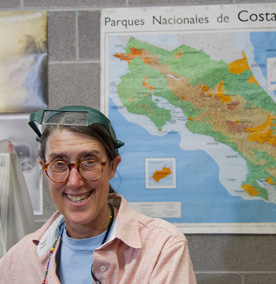One Course At A Time, grant let research thrive
The $270,769 National Science Foundation grant that biology Professor Marty Condon was awarded earlier this year is going to do more than just help fund trips to study tropical insect specimens. It’s likely to increase the number of known species by as many as 150.

That’s the advantage of working in the tropics, where there’s immense biodiversity, and plenty of undiscovered species. Condon and her team have discovered 50 new species of flies, and now they’re studying the parasitic wasps that prey on those flies. Condon expects to find 100 to 150 new species of those.
The grant is going to pay for trips to the tropics— Condon and students went to Costa Rica in March— and for the molecular work to differentiate the species of insects, as well as for student researchers to help with both. Some students like the lab work, while some like going to the rain forest to find the insects. But, she said, there’s an advantage to having students do both tasks: it prepares them for the real world.
The research they’re helping Condon do might get them noticed as well. Her research on biodiversity in the tropics was featured in the May 2009 issue of Science, and the findings she’s made have surprised many evolutionary biologists— including Condon herself. Most scientists thought that different species evolved in different niches as a way to avoid competition, she said. But her research has found numerous different species sharing the same niche. Why? She has some ideas, and figuring out the problem is part of the fun of being a scientist.
“Nature is just blowing our minds, and that’s fantastic,” she said.
Condon is going back to Costa Rica this summer to present a paper, but she’s going to take students with her too.
“I can’t be in Costa Rica and not go look for flies,” she said.
Part of the reason Condon has been able to pursue her research is Cornell’s One Course at a Time schedule. Condon can arrange her teaching to be in the tropics with students any time of the year.
“I’m here at Cornell College instead of a large research university because of One Course At A Time,” said Condon, who has conducted the tropical research for more than 30 years.



